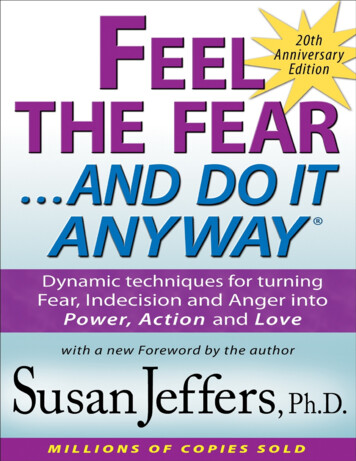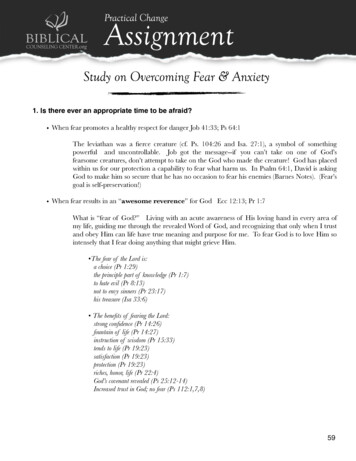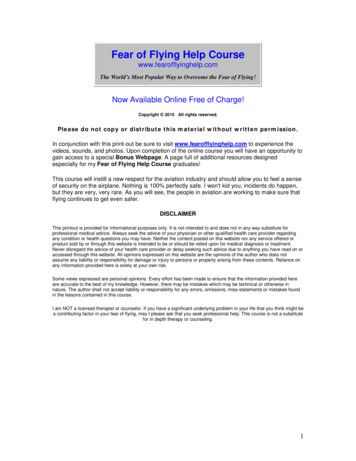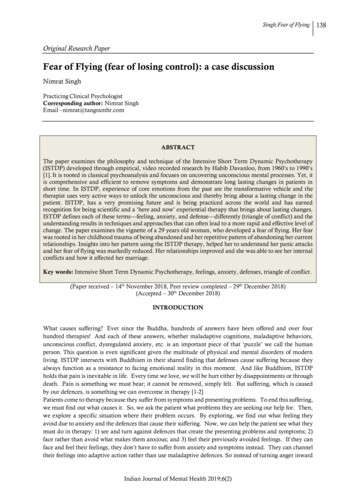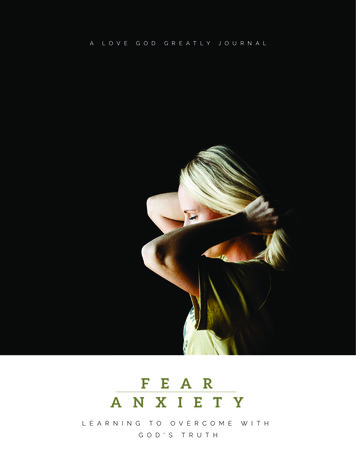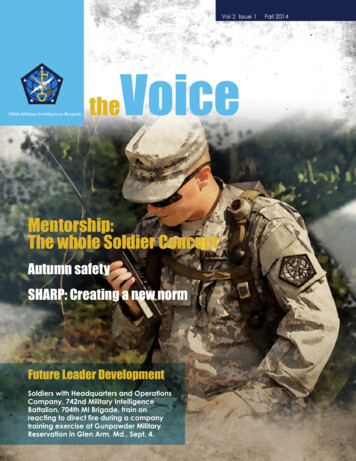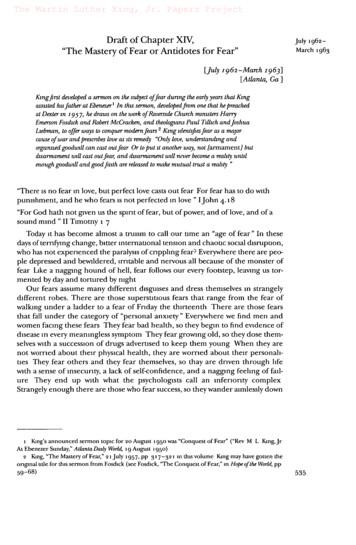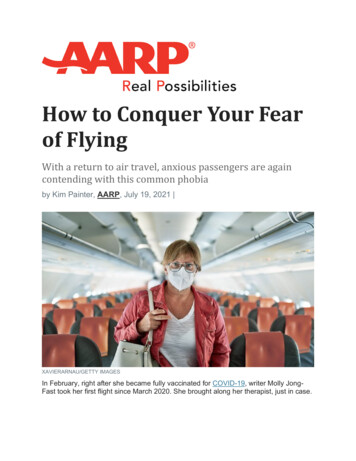
Transcription
How to Conquer Your Fearof FlyingWith a return to air travel, anxious passengers are againcontending with this common phobiaby Kim Painter, AARP, July 19, 2021 XAVIERARNAU/GETTY IMAGESIn February, right after she became fully vaccinated for COVID-19, writer Molly JongFast took her first flight since March 2020. She brought along her therapist, just in case.
Jong-Fast, 42, of New York City, is a lifelong fearful flyer who learned to cope yearsago, she says, by facing her anxieties and flying frequently. But that 11-month gap hadher worried that her anxieties might once again spiral out of control.Many flyers are feeling the same way, therapists say, as COVID-19 restrictions easeand planes fill up once more. It doesn't help, they say, that returning travelers are takingtheir seats at a time when unruly passengers are much in the news, sometimes due toconflict over mask wearing onboard (required by law).A return to the skies is especially fraught for those who were already afraid to fly.Because they are likely to have gone many months without flying due to the pandemic,“people who were fearful of flying before are finding their fears are more intense,” saysMartin Seif, a psychologist specializing in anxiety disorders who practices in New YorkCity and Greenwich, Connecticut. “They haven't done it in a while, and when youhaven't done something in a while, your imagination takes over.”For the latest coronavirus news and advice go to AARP.org/coronavirus.Seif and other therapists say they tell fearful flyers that every flight they take can makethe next flight easier. “The single most important criteria for determining howcomfortable we are doing something is how often we do it,” he notes.Just what people are nervous about varies quite a bit, therapists say. “We commonlythink of the fear of flying being about fear of dying in a plane crash,” but that's just onevariation, says psychologist Reid Wilson, director of the Anxiety Disorders TreatmentCenter in Chapel Hill, North Carolina. People who dread air travel may fear heights,crowds, closed-in spaces or being away from home. Or they may dread the specificsensations of taking off, landing or turbulence, or the idea of flying over water, he says.Many fearful flyers, therapists say, have a broader panic disorder and are most afraid ofhaving a panic attack on a plane. They fear symptoms, such as a pounding heart, achurning stomach and an overwhelming sense of doom. And they fear embarrassingthemselves by losing control in public.
Save 25% when you join AARP and enroll in Automatic Renewal for the firstyear. Get instant access to discounts, programs, services, and the information you needto benefit every area of your life.There's no solid research on how many people fear flying, but the most commonestimate is that it's about 20 percent of passengers, Seif says. Not all of them need tosee a therapist, but it can be useful for many who experience extreme anxiety about airtravel.How therapy can helpDominika, a 31-year-old North Carolina woman who prefers not to use her last name,says that she tried handling her flying fears with antianxiety pills. But she decided to seea therapist after a recent flight — her first in more than a year — left her so shaken thatshe vomited on the tarmac after landing. “I almost convinced my husband that weshould clearly take a ferry from the Bahamas to Florida,” to get home, she says.After a couple of sessions with Wilson, she has practiced managing her fears ofimpending disaster in other situations, such as walking along an ocean pier andclimbing up to a roof. Exercises like these are common in cognitive behavioral therapy,the standard approach for people with flying fears, Wilson says. CBT focuses onidentifying, understanding and changing thinking and behavior patterns. People whofear flying, Wilson says, learn through exposure that their discomfort can be fleeting andmanageable.It's time to consider therapy, experts say, if you suffer greatly through every flight ormiss out on much-desired travel. “This is highly treatable, so don't despair,” saysCornelia Tietke, a licensed clinical social worker at The Center for Travel Anxiety inWashington, D.C. “You don't have to white-knuckle it.”You can find therapists who work with fearful flyers at the website of the Anxiety &Depression Association of America (adaa.org).Some therapists offer group classes and may even take participants on flights. Butclasses held at U.S. airports, once commonly sponsored by airlines, are largely a thingof the past, Seif and Wilson say. One exception is the Fearless Flight program(fearlessflight.com), based at Sky Harbor Airport in Phoenix, where in-person classestaught by Ron Nielsen, a former commercial pilot with a master's degree in counseling,have just resumed after a 14-month pause. The free classes are held aboard astationary Boeing 737. Nielsen also offers online classes and coaching, as does TomBunn, another pilot turned therapist, who runs a program called SOAR(fearofflying.com).The best therapy is flying itself, insists Jong-Fast, who happens to be the daughter ofErica Jong, author of the 1973 novel Fear of Flying. She says she got through her first
flight since the pandemic hit just fine and is back to flying as often as she can — withouther therapist."I don't ever want to be unable to travel again,” she says.How to handle anxiety during flightEven if you don't opt for therapy, you can consider these therapist-recommendedstrategies for easing your anxiety about air travel. Know your triggers. Do you start getting anxious as soon as you buy a ticket,when you get to the gate or not until you latch your seat belt? Is your fear aboutbeing cooped up with strangers or about enduring takeoffs and landings? Justlearning to notice the anxiety when it starts can help you cope, Tietke says: “It'seasier to blow out a match than to put out a forest fire.” Know some facts. If you are afraid of crashes, it's helpful to educate yourself onhow planes work and how safe they are, Wilson says. Flying is not only much saferthan driving, it's also less likely to kill you than dogs, lightning or choking on food,he notes. Seif says it's also helpful for people to know that most fears about adreaded activity, such as flying, happen before the event — meaning the worstsymptoms may be over before the plane takes off. Expect to feel anxious. “When you notice your symptoms, tell yourself, ‘It's OK I'mfeeling this way. I expect to be nervous right now. I can handle this,’ “ Wilsonsuggests. He and other therapists say it's better to expect and accept your anxietythan to fight and deny it. Breathe. When anxiety starts, Wilson suggests taking a “calming breath.” Here'show: Completely exhale, then take a long, deep breath and hold it to the count ofthree. Then exhale slowly, saying the word “relax,” under your breath. Rest 15seconds, while letting your muscles go limp. Repeat two more times. Distract yourself. Once you acknowledge your anxiety, try shifting your attentionto a low-effort diversion, such as a “trashy magazine,” an adult coloring book or afunny podcast, Tietke suggests. Be sure to pack some options in your carry-onbag. Be careful with alcohol and medication. While one or two drinks might helpsome people, too many flyers drink too much, Seif says. (Take note: Several U.S.airlines are banning or curtailing alcohol service right now, partly because of unrulyflyers.) Some doctors will prescribe a small number of pills, usuallybenzodiazepines such as Valium or Xanax, to help anxious flyers through a trip.But those come with side effects, such as drowsiness and unsteadiness, that maylinger after you get off the plane.
Kim Painter is a contributing writer who specializes in health and psychology. Shefrequently writes for AARP's Staying Sharp and previously worked as a health reporterand columnist at USA Today.
The free classes are held aboard a stationary Boeing 73 7. Nielsen also offers online classes and coaching, as does Tom Bunn, another pilot turned therapist, who runs a program called SOAR (fearofflying.com). The best therapy is flying itself, insists Jong-Fast, who happens to be the daughter of Erica Jong, author of the 1973 novel . Fear of Flying
